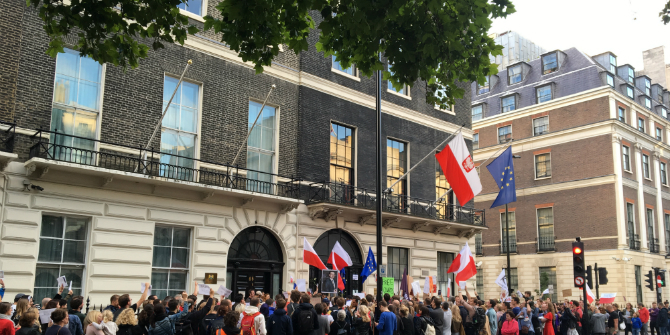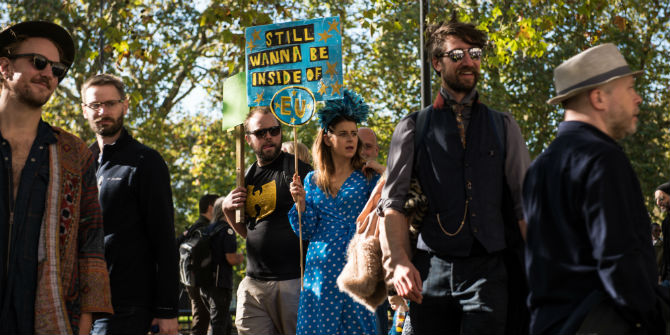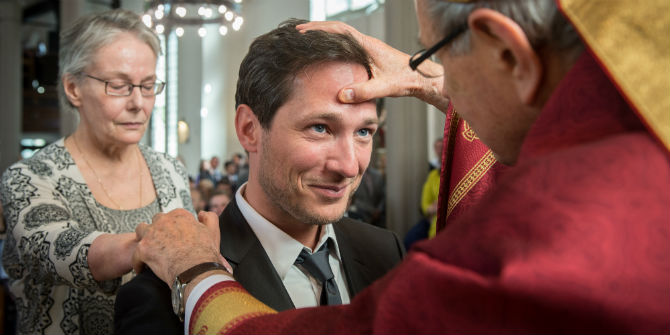 Despite fears related to the increase in hate crime numbers following the EU referendum, and the uncertainty around their future residency status, immigrants from Poland will not abandon their established lives in the UK as willingly as Brexit supporters might like. Aga Kulesa (Warsaw School of Economics) discusses narratives of belonging among Polish immigrants in the UK.
Despite fears related to the increase in hate crime numbers following the EU referendum, and the uncertainty around their future residency status, immigrants from Poland will not abandon their established lives in the UK as willingly as Brexit supporters might like. Aga Kulesa (Warsaw School of Economics) discusses narratives of belonging among Polish immigrants in the UK.
According to the latest ONS release, the most common non-UK country of birth in 2016 for UK residents was Poland. It is estimated that around 911,000 UK residents are Polish-born, which accounts for 10 percent of the total foreign-born population of the country. Polish is also the most common non-British nationality in the UK with a million Polish nationals resident in the UK in 2016.
The roots of the Polish community in the UK date back to the 1940s. A community of 94,000 Poles lived in the UK before 2004, when Poland joined the EU and Britain opened its labour market to all the new Central and East European Member States. After 2004 the free movement of people quickly becoming one of the bêtes noires of the British Eurosceptic movement. This culminated in 2016, when the Brexit vote campaign’s rhetoric regarding migrants was described by some academics as “divisive” and “uncivil,” and the campaign as such as “criminally irresponsible” and “guilty of dishonesty.” The research shows that the news coverage during the campaign was skewed in favour of Brexit while creating a climate of fear and danger.
Britain for the British, England for the English
Disappointment, shock, and uncertainty were among the most common feelings among British Poles following the EU referendum. “I was surprised by the result”, admits Łukasz Birecki, a 35-year-old social worker from London. “I think that it was a very bad decision to leave the EU, made by Britons on the basis of a biased and manipulated information. They did not understand what was going on during the campaign”, he adds. According to Paulina Panus, a 31-year-old HR specialist and yoga trainer from Kettering, Brexit was not a rational choice. “Only a minor percentage of leave voters shared some kind of economic justifications for their choice. The overwhelming majority of them voted for leaving the EU because of their aversion to foreigners—they wanted the Great Britain for Britons, and England for Englishmen. A lot of them, and especially uneducated people, thought that all of these foreigners—Poles, Lithuanians and all the others—would leave the UK immediately after the referendum,” she explains.
But some Poles were not surprised, like Magda Widawska, a 30-year-old receptionist from London. “I could have predicted the result of the EU referendum by observing all that noise in the media,” says Magda. “There was also this strange mood that I could sense even in my workplace, which is a private club for artists, businessmen, and journalists in London. It is a bit strange but I could sense that we, the British Poles, were needed and unwanted at the same time. The club, as the whole British society, was divided on Brexit—our club members even had a regular fight on the day of the referendum!”
According to some of the Poles, the growing negative attitude towards immigrants in the UK could have been observed much earlier than on the eve of the EU referendum. It was especially apparent in poorer communities, which were most affected by the post-2004 immigration from the new EU Member States. “There are still regions in the UK which have not recovered from the financial crisis yet,” says Marcin Wąs, a 37-year-old freelance photographer and filmmaker from London. “If you are poor and unhappy in your life, you are easy to manipulate. EU immigrants were scapegoats during the campaign. It was populist and very xenophobic and immigrants were used as a bugbear, but it was not merely about Poles.”
Yet some Poles think that the campaign was indeed directed solely against them, as do some Britons. “Next morning after the referendum I got a lot of messages with apologies from my British friends and colleagues,” says Marcin. “They were abashed, sad and devastated. They had a kind of ‘referendum hangover,’ I guess.” Magda Widawska, in turn, describes her post-referendum morning at work: “I was witnessing two totally opposite situations—some people were apologising to me, saying they were sorry and ashamed of the UK, while others were just extremely happy.”
Weeks after the referendum witnessed an unprecedented increase in hate crime incidents across the UK. Migrant communities, including the Polish one, were subjected to xenophobic and racist attacks. On June 26, 2016 the Polish Social and Cultural Association in west London found the words “f*** you” scrawled across the entrance. The same day dozens of Britons and other UK residents flooded the Association with thousands of flowers and “I’m sorry” cards. In July 2016, the number of hate crimes in England increased by 41 percent compared to the same period in 2015. On 27 August 2016, Arek Jóźwik, a Polish immigrant from Harlow, was attacked and beaten to death. “I could not recognise the country, which I had always praised for its tolerance and openness. All of the sudden there was ‘us’ and ‘them’,” says Paulina Panus. “I was scared,” confides Magda Widawska. And she continues: “I left my country in order to move to the other one, and this new country seemed to be safe. And suddenly there was this uncertainty and fear of being forced to move countries again. Should I move to Germany or Norway now and start everything over?”
 Civil society protests in front of the Polish Embassy in London (July 2017), image by @RochDW, Public Domain.
Civil society protests in front of the Polish Embassy in London (July 2017), image by @RochDW, Public Domain.
Houses, mortgages, families, and friends
According to research done by the Centre for Economic Performance at the London School of Economics, EU immigrants are better educated, more likely to work, and less likely to claim benefits than the UK-born residents. They also consume goods and services, creating increased demand, which, in turn, helps to create more employment opportunities. Moreover, EU immigrants pay more in taxes than they take out in welfare and public services. As seen in school tests, Polish children work hard at school to catch up with UK-born kids while their parents work hard in offices, factories, and shops to support their families.
Many Poles are also very serious about their new lives in the UK. They have invested a lot of effort in settling down and are not willing to easily abandon what they have built in the UK. “I do not think I could go back to Poland just like this and suddenly start a new life. It would be a big change, far too big,” says Paulina Panus. “People have houses, mortgages, families and friends here, and it is not that easy to leave it all. My home, my partner and my personal life are here and I will stay in the UK.” But as the debate on post-Brexit rights of EU immigrants has unfolded, the level of uncertainty among Poles regarding their future status in the UK has increased. “I do not believe that someone will tell me now that I cannot live in the UK because I do not have the British passport,” says Paulina. Magda Widawska adds: “I want to believe in such justice that people who arrived in the UK some time ago and have been working hard from the very beginning and paying their taxes will be allowed to stay.”
Now, even as the Prime Minister Theresa May has finally triggered the article 50 of the Lisbon Treaty and kick-started Brexit, little is known about the future of EU citizens in the UK. British non-governmental organisations, representing around 3.6 million EU citizens in the UK, have been campaigning to secure their rights (and the rights of UK citizens in the EU) since the 2016 referendum. But the UK government intends to use the issue as a bargaining chip during Brexit negotiations with the EU and avoids any conclusive statements. What is known is that EU citizens who have been residing in the UK for more than five years are given permanent residency rights. Since June 2016 many UK Poles have applied for permanent residency and many will be entitled to do so by the planned end of Brexit negotiations in 2019. But the situation is not clear or easy for everyone. Paulina Panus: “At the time of the referendum I just returned to the UK after an eight-month travel break. I had been living in the UK for six years before that break and it suddenly turned out that I could not apply for residency status because the maximum period you can spend abroad in order not to lose the continuity of your stay is three months. Who am I now to the British system?” Surely more questions like this one will arise as the Brexit talks with the EU progress.
Despite the invoking of Article 50, the high emotions of the EU referendum seem to have subsided and life is gradually getting back to normal for the majority of UK Poles. “When it comes to daily life, I do not feel any difference between now and before the EU referendum,” says Ewa Wolakiewicz, a 36-year-old sociologist from London. “One exception is the press, which goes back and forth about Brexit and the issue of EU immigrants’ rights. There are a lot of anti-governmental campaigns as well and it reminds me that we are still living in a state of suspension.” In the weeks after the referendum, the mainstream UK media were predicting a big outflow of Poles with such headlines as “Poles on Brexit: ‘I don’t think many will stay. Life in Britain is tough’” or “The Poles looking to leave the UK after Brexit.” Articles like the one published in November 2016 by The Independent on the uncertain future of British Poles and the unlikelihood of the massive outflow were rare. Presently, as the outflow has not materialised, the British Poles try to live their lives as they lived before, adjusting when necessary. Some have experienced quite unexpected consequences of Brexit: “I am now a bit overwhelmed with questions about how I feel and what I think,” says a respondent who wants to be anonymous. “Around ten different universities from across the UK and even one from Australia have contacted me already regarding Brexit, and, to be honest, I am too tired with the topic to think about it,” she explains.
Is their uncertain future and living in a state of suspense going to force the UK Poles back to Poland? The Polish government announced in February 2017 that it expects between 100,000 and 200,000 Polish returnees from the UK. Some Polish think tanks are even more “optimistic” and talk about 250,000 Poles expected to be back. It seems to be little more than wishful thinking. According to a survey by IBRIS, a Polish market and social research foundation, undertaken in June and July 2016, just 5.5 percent of UK Poles were considering a return migration to Poland (of which 57.7 percent were aged 65 and above) while 12.1 percent of them were thinking about moving to another EU state – like Łukasz Biercki who, if forced to move, would go to Sweden. More than 40 percent of UK Poles declared they would try to stay in the UK at any cost. Moreover, according to a survey by Boston Consulting Group conducted among the participants of the Polish Economic Forum (LSE), the interest in returning to Poland among Polish students of the best UK universities has dropped from 83 percent in 2016 to 75 percent in 2017. Mateusz Morawiecki, Polish Deputy Prime Minister, argued: “You have to have optimistic assumptions in order for the reality to change”—but it seemed like he believed in magic spells to make people go back to their homeland.
It is not so easy to simply decide to leave
It might be surprising but not every UK Pole thinks that the decision to leave the EU was wrong. Others think that it was not a serious referendum in the first place: “Taking into account the fact that the day after the referendum the top question on Google was “What is the EU?”, I think that an average UK citizen does not know much about the Union,” says Marcin Wąs.
Regardless of their views on the referendum, all are now pondering how Brexit will affect them financially. “I think that we can expect great instability and it will considerably affect the UK economy,” says Paulina Panus. “Most probably the poorest will be the most affected,” she adds. Ewa Wolakiewicz underlines the fact that the EU–UK relations are far more complicated than the average Brexiteer thought while voting: “It is not that easy that you decide to leave and that’s it! You have to know how to do it and how to function, also economically, without the EU.” Over a longer term, the condition of UK’s economy after Brexit will certainly determine, for many British Poles, the rationale on whether to stay or move to other countries.
UK Poles seem to be less concerned with how Brexit will affect the EU itself, but Paulina says: “I do not know much about politics but I think that the UK had a lot of power in the EU. If you lose such a powerful player, there is chaos. It will take some time until the EU will find a new power equilibrium.” Indeed, 2017 seems to be one of defining moments in the EU’s history.
With so many questions and uncertainties around Brexit, there is one thing that seems to be clear: most of the British Poles have built their new lives in the UK and they are there to stay, no matter how the UK immigration policy after Brexit changes. The British ship will sail away from the EU’s shores, but a strong Polish crew will certainly remain on board.
An earlier version of this article appeared first on Europe Now. It gives the views of the authors, not the position of LSE Brexit or the London School of Economics.
Agnieszka Kulesa is a political scientist, PhD candidate at the Warsaw School of Economics, the Collegium of Socio-Economics. She is a member of the Migration Policy Program at the Institute of Public Affairs (IPA), a leading Polish think-tank and an independent center for policy research and analysis.







A very nice article, not biased, and very well researched supported by opinions of real Poles; well written too.